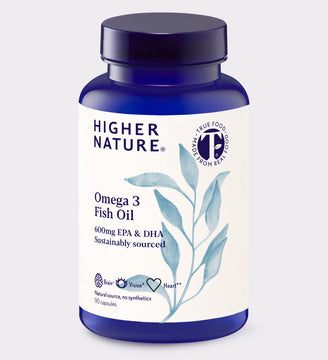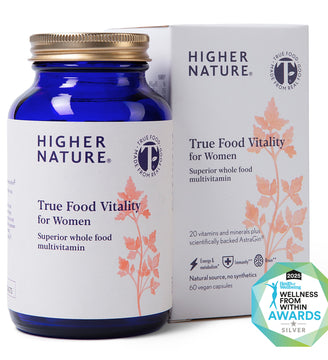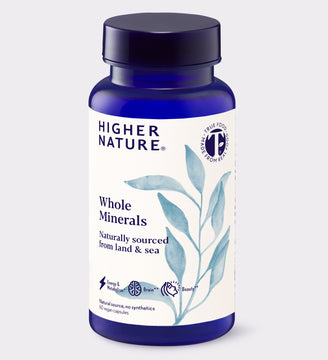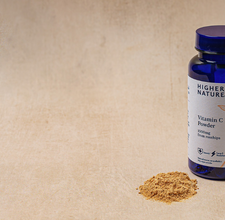
Nutrition - Back to basics
Elizabeth Houston - Higher Nature Nutritional Therapist - Dip BCNH mbant mCNHC
At Higher Nature our Nutrition Team often help those with specific questions or health needs, however we also aim to provide information for those who just want to live as healthily as possible. Sometimes there is so much information out there it’s hard to determine what the most important things to consider are.
So with that in mind below are some everyday diet and supplement recommendations based on our nutritional knowledge and scientific research, not gimmicks!
Mediterranean diet
There are hundreds of diets and food plans from paleo to fruitarian making all sort of promises, however the benefits from eating a Mediterranean diet are consistently reported. Several studies over many years of research have associated following a Mediterranean diet with a ‘reduced risk of developing multiple chronic diseases and increased life expectancy’. Data from several randomized clinic trials have demonstrated a beneficial effect in the prevention of illnesses such as cardiovascular disease, type 2 diabetes, atrial fibrillation, and breast cancer. This way of eating is endorsed by charities such as Diabetes UK and The British Heart Foundation.
So what does it involve? The Mediterranean diet is a set of loose principles that represent the traditional diet and lifestyle of those who live in countries around the Mediterranean, such as Greece, France, Spain and Italy. This diet typically includes plenty of fruits especially tomatoes, herbs, different coloured vegetables, legumes and pulses, as well as nuts, seeds, wholegrains, oily fish, unsaturated fats such as olive oil and avocados. It also includes a moderate amount of dairy (cheese and yoghurt mostly) and limited consumption of alcohol (red wine), meat and saturated fat, such as butter. They include very little if any ultra-processed foods such as ready meals and fast foods.
Cut down on sugar
We all know refined sugar is bad for us right? We know it’s associated with tooth decay and diabetes but that’s not all. Any excess sugar in the body not used for energy is stored as fat, increasing the rates of obesity and the related health consequences such as diabetes, certain cancers, and CVD. Nutritionists also believe that excess sugar in the diet contributes to many other chronic health conditions.
Added sugar comes in many forms and is sometimes hard to recognise. When looking at labels it’s important to know when the manufacturer is trying to sneak some added sugar in without you noticing! Look out for:
Brown rice syrup, fructose, corn syrup, dextrose, glucose, malt sugar, malt syrup, sucrose, treacle, lactose, dextran, golden syrup, barley malt, caramel, cane juice, mannitol, ethyl and maltol!
Balance blood sugar
Blood sugar imbalance is a common health issue but is often ignored or not taken seriously by sufferers. Symptoms of low blood sugar include having a ‘foggy head’, feeling weak or dizzy, lack of energy and tiredness. These symptoms are relieved by eating something sweet however this sudden rush of glucose causes the body to produce too much insulin to take the glucose away from the blood and into the cells, thus leaving a further drop and the aforementioned symptoms.
This roller-coaster of blood sugar imbalance is at the root of many health issues. Eating a high refined carbohydrate / sugary meal or snack will give you a burst of glucose (blood sugar) followed by a crash. Over time, high blood sugar (also called hyperglycaemia) can damage your beta cell in your pancreas. Damaged beta cells cause both a decrease in insulin production and an increase in your body’s resistance to insulin, type 2 diabetes develops over years of insulin resistance.
Stabilise your blood glucose by avoiding high sugar foods and balance all meals with complex carbohydrates, fats and proteins. For example if you eat porridge oats (carbohydrate) for breakfast adding nuts and seeds (fats and protein) will slow down the energy release from the oats and give you a more even supply of energy throughout the day. Supplements containing the mineral chromium may help, chromium deficiency is common in patients with pre-diabetes. Chromium supplements have been shown to help improve blood sugar control.
Omega 3
Omega 3 fats are vital for health, unfortunately many of us are deficient in this essential fat. Symptoms of low omega 3 include dry skin, joint pain and inflammation.
Crucial for eye, heart and brain functions, fish oil is the highest source of the omega 3 fats EPA and DHA. These are incorporated into our cell membranes and are associated with improving health conditions such as arthritis and cardiovascular disease (CVD). Unless you are an oily fish fan most people who do not take a fish oil supplement are low in omega 3 fats. Its best food source is from oily fish and many of us are not eating the recommended 1-2 portions weekly. Good sources include sardines, mackerel, anchovies and salmon.
Vegetarians can obtain alpha linolenic acid (ALA) a plant omega 3 from flax and chia seeds. ALA can be converted in the body into EPA and DHA. Flax seed oil is a perfect way to top up levels and great used cold on foods such as salads or can be taken straight from the spoon.
Vitamin D
Vitamin D levels in our body drop as the days get darker from October as the sun is not strong enough for our skin to produce it. Vitamin D is only found naturally in a few foods such as oily fish, in fact only about 10 percent of the vitamin D the body needs comes from food. Therefore everyone in the UK is recommended to take a vitamin D supplement between October and March.
Vitamin D is essential for the maintenance of normal teeth and bones as it helps facilitate the absorption of calcium but it is also needed for muscle function and immunity. In fact low levels of vitamin D are thought to be linked to higher incidence of autoimmune diseases and poorer outcomes from infections.
Probiotics
Our guts are host to billions of live bacteria, yeast and other microorganisms, often referred to as gut flora or the microbiome. We are beginning to understand how these microbes are vital not only to our digestive health but also to our overall health. There are around 1-2 kilos of bacteria living in the gut of an average adult. This eco-system is responsible for a whole host of roles, producing vitamins, aiding digestion, and helping keep our bowels working well. They also play a pivotal role in our immunity, working in conjunction with our immune system, 70% of which is located in the gut.
Although more studies need to be conducted, recent research indicates that gut flora may have a role to play in mood conditions, blood sugar control, appetite regulation and weight management.
Certain medications, in particular antibiotics, stress and poor diet choices can play havoc in the gut. Diet is crucial as the microbes feed on what we are eating, so the healthier and more diverse we are the healthier our gut. More obvious symptoms of bacteria imbalance include painful cramps, bloating, constipation and diarrhoea.
You can top up your microbiome by eating fermented foods such as, sauerkraut, live yoghurt, tofu, kefir, tempeh and miso. If you would rather take a supplement we have a range of live bacteria to choose from including our Pro-Intensive Extra which is a high strength multi strain support and ideal for post antibiotic use, or our new Pro-Immune that has been formulated with zinc and elderberry extract for added immune support.
References:
Tosti et al (2018) Health Benefits of the Mediterranean Diet: Metabolic and Molecular Mechanisms The Journals of gerontology series A, biological and medical sciences. Health Benefits of the Mediterranean Diet: Metabolic and Molecular Mechanisms - PMC (nih.gov)
Rafiei et al (2014) Chromium level in prediction of diabetes in pre-diabetic patients Chromium level in prediction of diabetes in pre-diabetic patients - PubMed (nih.gov)


















